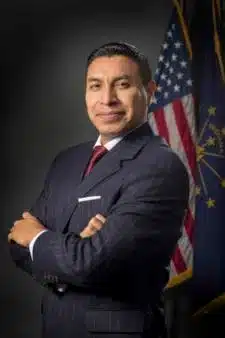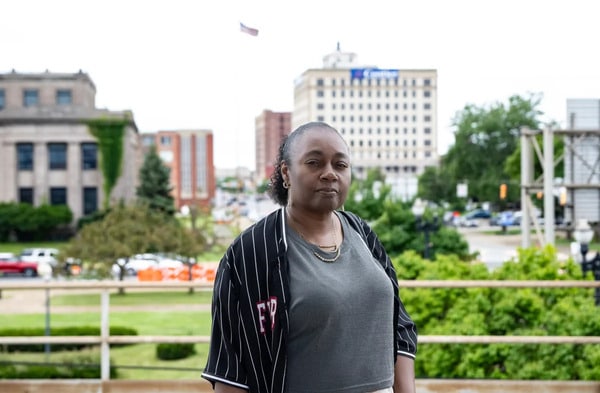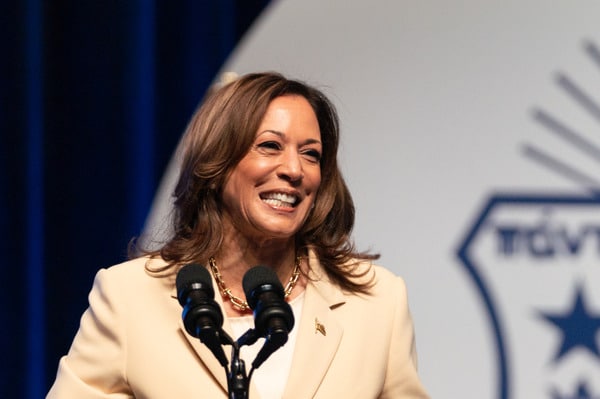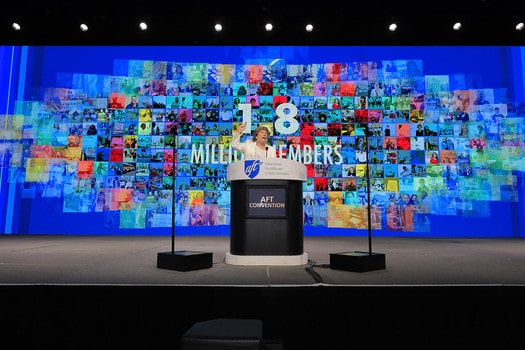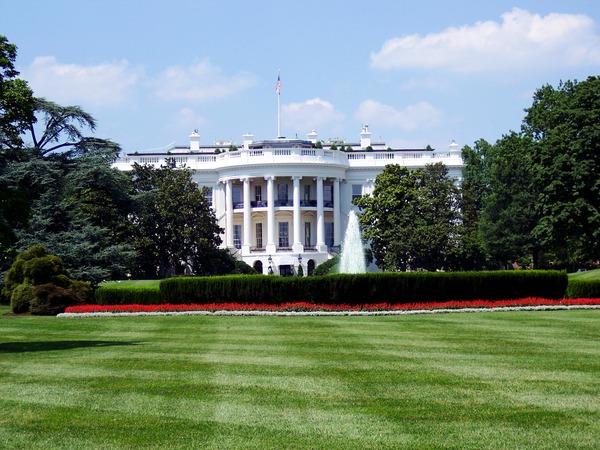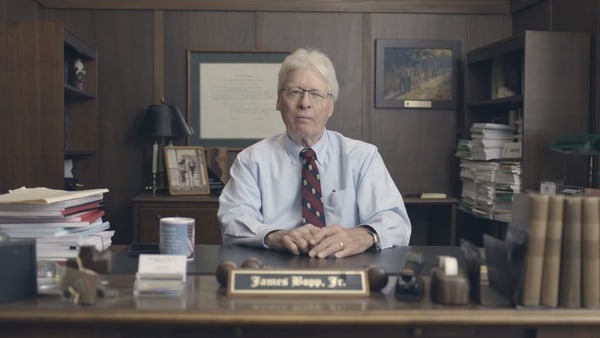Diego Morales wants to tell voters why he’s running and what he’d do if elected as Indiana secretary of state.
But with a campaign beset by scrutiny and controversy, the Republican candidate is often forced on the defensive.
“It is important for me to make sure that all others will have the same opportunities as me to register to vote and be part of the election process,” Morales said. “And in order for me to continue to protect the American Dream that I’m experiencing, I believe it starts at the ballot box. I believe it starts at the polls.”
Morales spoke with The Statehouse File on Friday before spending the weekend at the Republican leadership meeting for the 4th congressional district, the Brookston Apple Popcorn Festival, the Goshen Hispanic Heritage Festival, the Festival of Faiths, Indy Taco Fest and the Johnson County GOP rally.
He prides himself on being a “grassroots guy” who has visited every Indiana county and is on the campaign trail “not six but seven days a week.”
Morales’ past time in the secretary of state office
Despite the long weeks during his campaign, reports of a questionable work record came up during his 2018 run for U.S. Congress and have resurfaced.
The Associated Press found that, a little over a decade ago, Morales had issues during two separate employment periods in the Indiana secretary of state office.
Records the AP obtained stated that, among other things, Morales had a “lack of focus” and “poor execution.”
The first stint was when Todd Rokita, current Indiana attorney general, was secretary of state.
Rokita, however, has supported Morales’ run for office and described Morales’ exit as “on good terms” in a letter to Republican delegates prior to Morales winning the nomination, according to The Indianapolis Star.
Morales also pushed back, calling the documents detailing his supposedly subpar work ethic the result of office politics.
Priorities if in office
Morales mentioned each division of the secretary of state’s office—business services, auto dealer services, securities and election—and the ways he wants to improve them.
For the business services division, Morales would “streamline the way small businesses in Indiana will work with the secretary of state’s office,” making it easier for Hoosiers to start businesses.
“INBiz, the Secretary of State’s one-stop resource for registering and maintaining a business, has become a backbone of the Hoosier economy,” former secretaries of state Ed Simcox and Todd Rokita said in a Sept. 15 op-ed. “Diego has plans to expand INBiz’s offerings because, as a small business owner, Diego understands the unique and emerging needs of entrepreneurs and our state’s business community.”
“With the auto dealers division, my goal is to make sure that we can get the title for the cars efficiently to this industry,” Morales said.
Morales also wants to teach financial literacy to young adults—“just bring back the basics to them”—such as balancing a checkbook. He’d also focus on helping ensure the elderly aren’t scammed when “they make their own investments.”
Last is the election division.
“My No. 1 goal is to increase voter confidence,” Morales said.
Morales would strengthen voter ID laws and make it “easy to vote, harder to cheat.”
(Studies have shown fraudulent voting is already rare. The Associated Press found between 400 and 500 potential cases for Biden in the 2020 election in the six states of Arizona, Georgia, Michigan, Nevada, Pennsylvania and Wisconsin, “represent[ing] just 0.15% of his victory margin in those states.”)
Morales would also take county clerks abroad to be international election observers. In 2019, Morales spent time as one in El Salvador and Guatemala for each country’s presidential election.
One reason Morales gives for this is to expose county clerks to the fact that many Latin American and European countries require photo IDs to vote, showing it’s “natural” and “common sense.”
A 2019 research paper from the right-leaning Crime Prevention Research Center found that an ID is mandatory to vote in every European country except the United Kingdom.
And the Carter Center (founded by former president Jimmy Carter and his wife, Rosalynn) reported that “nearly every Latin American country surveyed utilized a single national ID card for voter identification, with only minor variations,” in 2013.
“During former Secretary of State Todd Rokita’s administration, Indiana became the first state in the nation to pass and implement photo ID laws,” Simcox and Rokita wrote in the op-ed submitted to REAL News Michiana by Morales’ campaign. “To further improve Indiana elections, Diego proposes applying these photo ID requirements to absentee voting.”
“Additionally, he will update antiquated voting equipment with advanced machines that feature paper backup systems, making it easier to conduct audits when necessary,” Simcox and Rokita said.
Morales says he also wants to see more minorities voting—a goal tied to his identity as a Hispanic Latino.
And he’s not waiting to see if he’s elected, Morales said.
“You know, during the summer, during the Black Expo, I was registering voters,” Morales said. “During the Hispanic Expo, I was registering voters.”
Before nabbing the Republican nomination from current Indiana Secretary of State Holli Sullivan, Morales said he would slash early voting time in half, from 28 to 14 days.
Now, Morales says, “the 28 days is working great and is gonna continue to stay the same.”
When asked again why he changed his mind, Morales repeated himself: “The 28 days is working.”
In a statement provided to the Indiana Capital Chronicle, Morales said, “In addition to talking with voters, I am meeting with county clerks. Based on those conversations, I believe the current 28-day early voting timeline is working.”
Vocation, vehicle and veteran controversies
In the same article regarding Morales’ work record in the secretary of state office, the Associated Press also reported he called himself an adjunct professor when “adjunct instructor” is the more correct term and has given fuzzy details involving his business.
Currently, Morales’ LinkedIn says he’s been a “Business Executive, Consultant, Entrepreneur” since 2018 but doesn’t list any specific places of work.
Two months ago, Indy Politics reported Morales’s campaign spent over $40,000 on a vehicle.
“Trust between voters and candidates is based on transparency. The need for a reliable vehicle to run a campaign is a valid need that requires no explanation,” libertarian candidate Jeff Maurer told Indy Politics. “But we would like to understand the thought process of using campaign funds to purchase a vehicle for a four-month long campaign when borrowing, and especially leasing, would have been a much more practical use of campaign funds. Transparency requires answers.”
Political science professor Gregory Shufeldt told The Indianapolis Star it was a “bad look to be continually tied in unnecessary controversy, especially I would say the lavishness of the price of the car when in general, even if a campaign needed transportation, most Hoosier families aren’t buying cars for $43,000.”
The Star reported the campaign said it will sell the SUV post-election, putting the money back into the campaign.
Morales’ use of the descriptor “veteran” was called into question last week as he is considered one by Indiana code but not federal code.
By regular parlance, to most, Morales is a veteran, Teresa Mankin said.
The former executive director of the National Guard Association of Indiana suggested Morales may inflate his bio as a veteran, however, and Star opinion columnist James Briggs did the same.
2020 election confusion
As Morales drives across the state, county to county, looming in the rearview mirror is the 2020 presidential election.
Morales authored a searing op-ed, taking to task Sullivan for not commenting on the election.
“It is stunning and incredibly regrettable that Holli Sullivan wants to be elected as the chief election officer of the Hoosier State, and she will not even acknowledge the most controversial election in American history,” Morales wrote.
The 2000 presidential election between George Bush and Al Gore came down to a Supreme Court decision and led to conspiracy theories from the left. (Morales called the 2020 election “Bush v. Gore on steroids.”) There are still accusations of voter fraud in the 1960 election that saw John F. Kennedy narrowly beat Richard Nixon. And the 1876 election was settled through an informal compromise in which House Democrats upheld the Electoral Commission decision putting Republican candidate Rutherford B. Hayes in the White House, as long as Hayes removed troops from the South, thereby ending Reconstruction.
Morales, comparatively to Sullivan, was more than willing to take on the topic, writing, “The 2020 election was flawed and the outcome is questionable.”
His reasoning came down to some states changing election laws last minute, in-person voters on Election Day faced more “scrutiny,” and social media platforms trying to hide a NY Post report about Hunter Biden’s laptop.
In the March 8 op-ed, Morales said, citing a CNN article, that “Among enthusiastic, motivated [Republican] midterm voters, 86% of them do not believe that Biden won legitimately.”
Six months after the op-ed and three after winning the Republican nomination on June 18: “I’ve been clear to say that President Biden is the legitimate president,” Morales said to FOX59.
Morales told the Indiana Capital Chronicle at the end of June, “As I have said many times, Joe Biden is the President of the United States.”
“I can tell you this: Biden is the legitimate president,” Morales told The Statehouse File on Friday.
When asked if he thought there was voter fraud but not enough to overturn the election, Morales didn’t give an answer, instead repeating himself and saying Biden is a “horrible” president.
Morales ended his interview with The Statehouse File by expressing the hope that “the next generation of Hoosiers, perhaps within the Latino community,” see him rise to the office of secretary of state and see that they can also be anything from a mayor to the president.
“So I am trying to give back, creating some hope and open the doors for others,” Morales said. “So, for me, it’s easy and simple. You know, it’s never been about me. And I should hope people will see that the American Dream is still alive and well in Indiana.”

